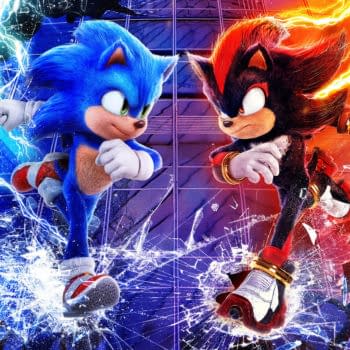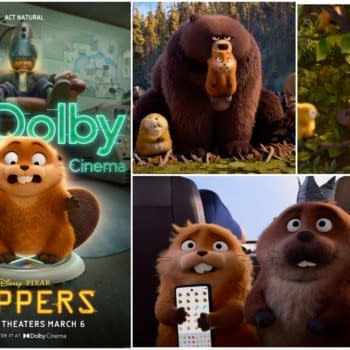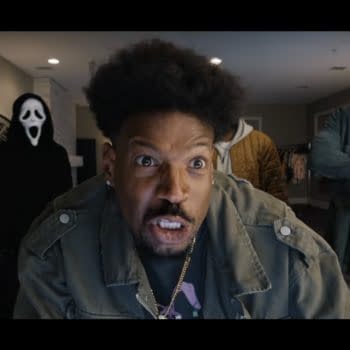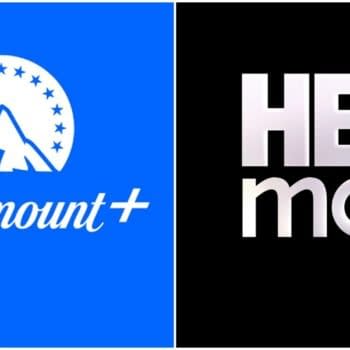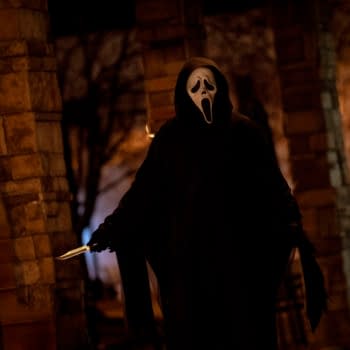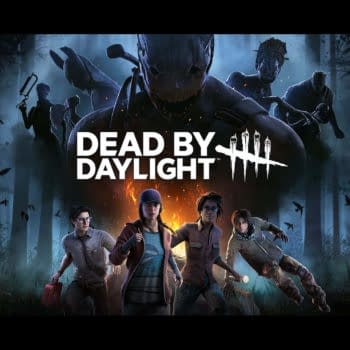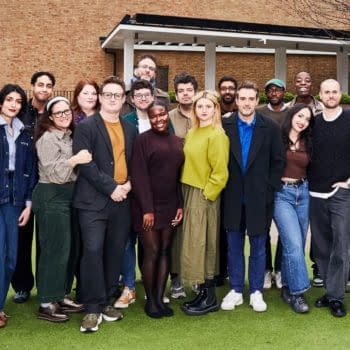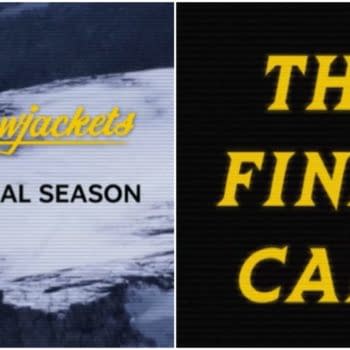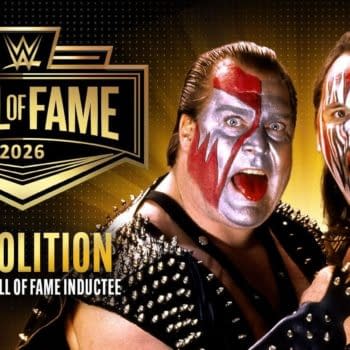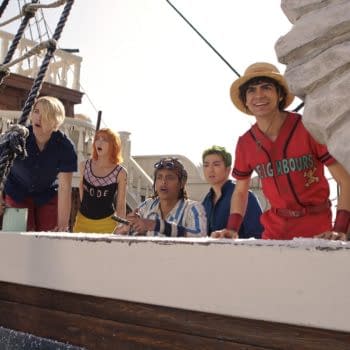Posted in: Movies, TV | Tagged: american gods, bryan fuller, entertainment, neil gaiman, ricky whittle, starz, television
Taking Confessions At Starz's American Gods Media Day
"All Revelations Are Personal. That's Why All Revelations Are Suspect":
Taking Confessions @ STARZ's American Gods Media Day
by Ray Flook
American Gods descended upon New York City last week as STARZ's Programming Publicity & Corporate Communications Team turned The Langham Hotel into a makeshift "media pulpit" to preach the "gospel" of Neil Gaiman's award-winning novel to the congregation of gathered press.
Okay…enough with the cutesy religious wordplay…let's get down to business…
STARZ's American Gods media day afforded Bleeding Cool and a number of other media outlets the opportunity to meet with cast and crew, including: Executive Producers Gaiman, Bryan Fuller and Michael Green; Bruce Langley (Technical Boy); Pablo Schreiber (Mad Sweeney); Orlando Jones (Mr. Nancy); Crispin Glover (Mr. World); Ricky Whittle (Shadow Moon); Ian McShane (Mr. Wednesday); Emily Browning (Laura Moon); Yetide Badaki (Bilquis); and Kristin Chenoweth (Easter). Over the course of more than four hours, I had the opportunity to cover a number of issues with them and take away some interesting perspectives, which I'll be highlighting in a little bit. But a media day is about more than just questions and answers, so along the way I'll give you some "behind the scenes" thoughts that you might not get in a glorified press release disguised as an article.
- There was food. Breakfast and lunch. And it was good. In particular, the bagel with cream cheese and mini-croissants. And I drank more coffee than a human body ever should. Now let me be clear: I know a number of you are reading this and disgusted by the fact that I started my report talking about the free food that we got. I can respect that. But in my defense? And with all due respect? I don't care. I was really hungry. And who doesn't appreciate free food? Don't judge me, because this next one probably won't make you too happy either…
- Swag bag was pretty sweet: tote bag, t-shirt, sunglasses and a copy of the novel. But what impressed me the most? There were still bags left on the table at the end of the day. Go ahead…re-read that last sentence…I'll wait. This was one of those very rare instances where the adage "if it's free and not nailed-down, it's fair game" actually didn't apply…an instance as rare as a unicorn riding Halley's Comet on February 29th.
- The interviews were conducted roundtable-style, with thirty-five minutes allotted for each interview session. The sessions were broken-down as follows: Gaiman; Fuller and Green; Langley and Schreiber; Jones and Glover; Whittle and McShane; Browning and Badaki; and Chenoweth. I lucked-out with the room I was assigned because this one of the friendliest press groups I've worked with…everyone was helpful to one another and respectful enough to let each outlet get a chance with their questions.
- Fuller and Green expressed their appreciation for STARZ "getting" the novel and what they wanted to do with it, with Fuller in particular showing his personal preference for television over film when it comes to literary adaptations:
"I think that is one of the beauties of the literary evolution of television in these adaptations because if American Gods was a movie we wouldn't be able to tell the expanse of a story that we get to dive into in the show. And if you look at other books that are being adapted… and whenever I see a book coming to television as opposed to a movie I'm thrilled because I know there is going to be… the nuances that I fell in love with are going to have a better chance of being represented in television than they do in a film."
- For Green, it wasn't a matter of STARZ ever telling them "no" as much as them trying to get he and Fuller to have realistic expectations, even when those "realistic expectations" end-up getting surpassed:
"I think early on when we showed them our first… first round of outlines, they said: 'if you can accomplish half of this we'll be thrilled.' And we got about seventy percent. They've been wonderful partners about that."
- The horrific visuals of the lynching scene at the end of the first episode ("The Bone Orchard") and our introduction to Mr. Nancy at the beginning of the second episode ("The Secret of Spoon") didn't happen that way by accident, as Green pointed-out:
"That was a deliberate choice. We did want… I mean, we felt the first episode ends with that gasp of horror of a terrible image to deal with. We actually restructured our first few episodes looking at them in the editing room and realizing that that image was so strong and coming into the second episode there were several themes at play, especially with the way that it ended. And we ended up moving the Mr. Nancy coming to America from a later episode to that realizing that sometimes the show talks back at you in the editing room—and one of the advantages of these type of television shows is that you have the time to experiment with that and try it, and show it to the network and studio and see what they thought .and then everyone can see that the elements got stronger and the dish became more composed, and that we were forcing people to confront that. That we weren't just belying it, that we weren't just being cavalier about things that are upsetting quite possible."
- Reporter's Note: Been a fan of Fuller's work in the past (especially Hannibal) so it was an honor meeting him in-person, and it was clear by the end of the interview that both Fuller and Green have a genuine love and respect for the novel and want to do it justice.
- When it comes to literary adaptations, you can't escape the unavoidable question: what happens when the show catches-up with where the author is…and the author doesn't have a new book in the series coming-out any time soon ("The George R. R. Martin Effect")? Gaiman wanted us to know that that's a conversation he's already had with Fuller, Green and the network:
"We have been talking about that since before we started. I had to do a J.K. Rowling kind of thing with the guys right at the very beginning and go "ok". I have not yet written AMERICAN GODS 2. It's on the giant list of things I have to get to one day, but there is a giant list. However, if it actually happens might have to be moved up in the list of things… but let me tell you these important things about the plot because you need to know that these lines of apparently inconsequential dialogue and these bits of conversation in the book, you know, which are things as of that are things you might as well go "'I'll leave that out" are actually… they are the grappling hooks on which we attach the ropes that AMERICAN GODS 2 is going so it is important that this character is in there and important that that line is said because we'll get that."
- Reporter's Note: Gaiman is one of those rare individuals who can give a fourteen-minute answer to a question and you still can't get enough of what he has to say. I'm not sure if it was because he's gotten the question a lot in the past or was just ready going-in, but Gaiman not only didn't seem surprised by my question but he seemed almost excited to respond by telling us that it's already been discussed.
- Our introduction to Mr. Nancy in the second episode was an award-winning one, with an intensely jaw-dropping performance from Jones. I asked him about what it's like to move between comedy and drama, but for Jones it's all about the character and his freedom to give that character life:
"You know… I would say that it's hard for me because I think it's really just based on where you enter into the conversation, right? So, for me? Back when I was on Liberty Heights, you know? Little Melvin is a scary son of a bitch, frightening creature. That was thirty years ago. So for me, between that, the drama, the time machines… I've done so much throughout the course of my career, that part isn't really special to me. Doing this character, THAT was really special to me. And I agree with you that what he is saying and the time that he is saying it in, I think is what really resonates. But performance-wise: to me it's just sort of like, 'Alright: this is my Mr. Nancy, this is how I see this guy… this is how I want to put him on. Are you guys good? Yes! Great! Let me go do my Mr. Nancy'."
- Reporter's Note: Jones was exactly the right combination of humor and thought-provoking throughout, impressive considering the weight of some of the topics in-play. I genuinely believe Jones is going to get some serious press out of his performance as Mr. Nancy, and awards season should prove interesting for him. One regret: Glover had a great follow-up answer about comedy and tragedy as a follow-up to Jones answer to my question, but the recording completely crapped-out.
- While we've been given only a small sample of what Technical Boy has to offer (but he does make a helluva' impact while on-screen), a friend who I was screening the episode with told me that he reminded her of Joffrey from Game of Thrones and that she already knew he was going to be "someone I'm going to hate and like at the same time." Langley doesn't seem to have a problem with that:
"Wow, that's real hatred. (laughter) Great. Honestly, great. I mean, one of the few things about the show is that it is a very personal experience. People are going to enjoy certain aspects for their own reasons and be into it. And yes, there are certain aspects of the character I absolutely understand are going to rub people very, very quickly up the wrong way. Sure."
Though Langley did make this friendly request: "Please don't send me death threats."
- Reporter's Note: Our interview roundtable with Langley and Schreiber was one of the more fun, friendly and free-flowing of the sessions. Schreiber's Mad Sweeney is a seething force of nature, and Langley showed a level of maturity in his responses that's usually reserved for actors with years of experience and time spent in numerous press junkets.
- Badaki's portrayal of Belquis, Goddess of Love, will be one of the most talked about performances of the series for many reasons. Putting aside for a second that she is a god, Belquis is a sadly-rare character in pop culture: a woman of color who is in control of her sexuality and knows how to use her power and not be a victim for "daring" to embrace her sexuality. For Badaki, the journey to defining Belquis was one that allowed her to make some fascinating observations on love, sex and intimacy:
"The idea of this goddess of love being almost anemic in this present day because the intimacy is something that's not pursued as much or is almost something people are afraid of, right? Afraid of talking about."
"I'd say a perfect example is: Bruce and I were walking into a room. Bruce is Tech Boy. And, you know, we are introduced, and they're 'Hey! This is Cynthia, she plays the goddess of love. And here's Bruce, he plays the god of technology.' And everyone had a… 'Oh, you gotta' read this book about technology…' and 'You gotta' watch this documentary of blah, blah…' and then they just look at me and kind of go 'Umm… anyways… that technology thing…' And I found that fascinating because that already is talking about how afraid people are about that issue, about intimacy in general."
"In getting this role, I'm like: How do I get to play the goddess of love. I don't know. You know what? Why would you do this? And I realize this because I had to make that journey. I had to ask myself: What does sensuality mean? What does intimacy mean? What does…. All of these questions that I had maybe, myself, shy away from a little bit. And with this role you can't shy away from it. You have to dive in. (laughter) You have you dive right in. Yes, I said it. And I was just so joyful in how empowering it was."
- Reporter's Note: I know I wrote this in my "takeaways" article from earlier this week about the first episode, and I know I'm starting to sound like a recording on endless loop so I'm going to change my message a little bit: Yetide Badaki will be taking home at least one major award within the next five years…whether it's an Oscar, Tony, Emmy, or whatever. Her performance is that…damn…good. So write her name down now because she's going to be a house-hold known in no time.
- Thirty years ago, a show like American Gods would've been laughed out of "The Big Three" networks before it got past the lobby receptionist. But innovations like cable television and the internet have thrown open the doors to programming competition on a number of levels…and with that growing need for content comes a willingness to try bold and different projects. That's not a point lost on Chenoweth…and she likes where things have gone:
'It was all about the three. The Big Three. Now it's almost like "don't do that." I mean, you do, but you know what I mean? There are no more rules. I like that. There are no more rules. I find myself more driven to shows that are on the cable. And I just did a pilot for a major network and I appreciate what all of them give, but what I like is that there are more choices."
- Reporter's Note: Chenoweth is definitely a huge fan of the opportunities that media like STARZ, Netflix, Amazon and others offer when it comes to creative content. As fun and interesting as her interview was, I couldn't help but imagine how sweet it would've been if she sang each of her answers. Ahhh…a man can still dream… Watching Whittle lift-up Chenoweth as she was leaving our room and he was coming in was one of those moments when I wished photographs weren't prohibited because it was a really sweet moment.
- The chemistry between Whittle's Shadow and McShane's Mr. Wednesday is unmistakable within the first minutes they're sharing screen time together, which was an essential hurdle for the show to overcome as their relationship serves as the foundation for what is to come…at least until someone else enters the equation. For McShane and Whittle, the dynamic between Shadow and Mr. Wednesday was not lost on the show's creators:
McShane: "I think it was very smart of them to, whether it was by design or not—the first scene we did was the airplane scene, which is the first time we meet. So it's like the end of that very, very long day that we have sort of found ourselves whatever, working together it was very easy after that. I mean, Ricky and I just went into set. You know? I love what I do, so does he. It just seemed to fit very naturally. Also, we spent a lot of time together. I mean, the first three episodes were done as a major feature film. They were done as one episode—which is one of the advantages; and one of the pitfalls for them because if they had done it like one episode it would've been easier to get the tone of the entire movie earlier."
Whittle: "Shadow and Mr. Wednesday had to have this dynamic and this chemistry for the whole show to work. Because amongst all this kind of fantastical CGI and craziness is a very grounded, real story between two guys in a car. And they are actually some of my favorite parts of the whole show—just Shadow and Wednesday shooting the shit in a car."
- Reporter's Note: Whittle and McShane genuinely seem to like one another and get along incredibly well…maybe partially because (as Whittle puts it), "We are from the same part of the world. We support the same football team. Manchester United." Whittle was incredibly friendly, funny and down-to-earth…and McShane? Ian McShane was exactly what I was expecting and more. Probably the best way for me to explain it in the fewest words possible would be this: McShane could explain the tax code to you over the course of four hours and a dozen beers and you'd still want him to keep going.
So that's a wrap on how the press day went…
American Gods airs Sundays on STARZ.
Ray Flook has been a contributing writer to Bleeding Cool since 2013 and "Ray-splaining" geek stuff his entire life. You can follow him on Twitter at @oldmangeek88; on Instagram at @oldmangeek; and soon through the Big Bad Geek podcast.













